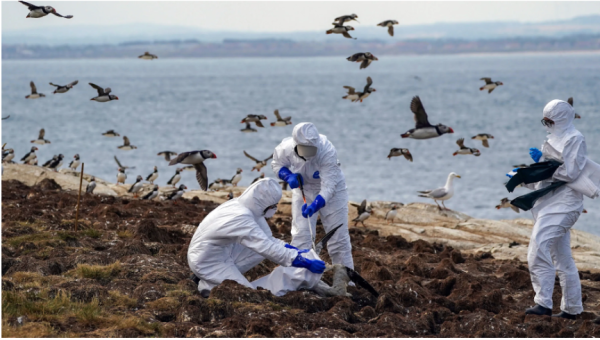Image from MIT Technology Review
As of December 2023, cases of Avian influenza have surged in number, causing serious concerns over the renewal of the bird flu. Health officials and agricultural experts are dealing with the spreading outbreak of Avian influenza, which is causing serious concerns for the health of humans and animals alike, while also affecting the poultry industry.
Avian influenza, also known as the bird flu, is an infection that mainly affects birds. It is a harmful disease that is highly contagious and often spreads through wild aquatic birds like swans, ducks, and geese. Still, it can also infect other bird species including domestic livestock. Some examples of such are chickens, ducks, and turkeys. The virus spreads through contact with infected birds from their saliva. According to CNN, “The virus has spread through saliva, mucus and feces from infected birds… in mammals, some scavenging species have come in contact with the virus by eating infected bird carcasses.” Regions with a densely populated area of birds are especially vulnerable to the fast transmission of the virus. Many countries are affected by the outbreak, affecting wild bird populations and poultry farms in parts of South America, Asia, Europe, and some regions of Africa.
There are serious concerns over the virus infecting other mammals, including humans, sea lions, pigs, cats, dogs, and in some instances wild animals like tigers and leopards. “…experts are closely monitoring the lethal pathogen’s spread to other mammals, such as when more than 50 sea lions were found dead in August in Argentina” (CNN)
The bird flu infects humans through close contact with infected birds or polluted areas where there are a lot of bird droppings present. Most of these infections in humans are rare but may lead to serious illness or in extreme cases, can result in death. Although it is rare for avian influenza to spread to other mammals, the transmission would occur when the infected birds and other animals are close to one another. While the virus may spread to other mammals, the virus itself will not easily spread between species, and rarely can the virus maintain continuous transmission between the different species.
The recent renewal of the Avian influenza virus has significantly impacted the poultry industry. Currently, the poultry industry has been losing revenue and production. This virus also led to trade interference due to restrictions placed on poultry imports from impacted countries. To stop the spread, nations have been cautious in buying vast amounts of poultry products, as disruptions in production can affect the amount and accessibility of poultry foods. Which has had an impact on the international poultry industry.
Scientists are making serious efforts to slow the spread of Avian influenza, emphasizing the need for a united front, strict quarantine measures, and increased public awareness campaigns. Global health organizations like the World Organization for Animal Health (OIE) and the UN Food and Agricultural Organization (FAO) are alert and pushing for fast collaborative action to help contain the outbreak.

